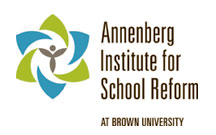Program to Address Disparities in School Discipline Policies that Fuel “School to Prison Pipeline” in Four U.S. Cities
Resource type: News
Annenberg Institute for School Reform | [ View Original Source (opens in new window) ]
 PROVIDENCE – Brown University’s Annenberg Institute for School Reform (AISR) announced today a $1 million, two-year grant from The Atlantic Philanthropies, a limited-life foundation, to engage community and school-district partners in four major U.S. cities with the goal of addressing school discipline practices and policies that contribute to a disproportionate number of low-income students of color leaving school and entering the criminal justice system – what is commonly called the “school-to-prison pipeline.”
PROVIDENCE – Brown University’s Annenberg Institute for School Reform (AISR) announced today a $1 million, two-year grant from The Atlantic Philanthropies, a limited-life foundation, to engage community and school-district partners in four major U.S. cities with the goal of addressing school discipline practices and policies that contribute to a disproportionate number of low-income students of color leaving school and entering the criminal justice system – what is commonly called the “school-to-prison pipeline.”
“Racial and other disparities in the use of exclusionary discipline practices such as suspension and expulsion are significant contributing factors to the persistent achievement gaps that sustain a channel of failure,” said Warren Simmons, AISR’s executive director. “We are grateful to The Atlantic Philanthropies for the opportunity to better understand the impact of exclusionary discipline so that useful and effective interventions can be designed.”
According to Dignity in Schools, black students are 3.5 times more likely to be expelled than their white counterparts, and Latino students twice as likely. While male students are suspended and expelled more frequently than female students, and boys of color are suspended and expelled at higher rates, racial disproportionality in the use of exclusionary discipline is more extreme among girls than boys.
The “school-to-prison pipeline” is a disturbing national trend characterized by the funneling of K–12 students out of urban public schools and into the juvenile and criminal justice systems. The pipeline encompasses the growing use of zero-tolerance school discipline, school-based arrests, disciplinary alternative schools, and secured detention to marginalize the most at-risk youth and deny them access to education.
A December 2012 U.S. Senate hearing entitled “Ending the School-to-Prison Pipeline” amplified awareness of the problem and prompted alternative approaches to discipline that address the underlying challenge: shifting school climate to promote student achievement, resilience, and school safety, so that incidences requiring exclusionary discipline are diminished.
“Our goal is to support districts and community partners in taking on the important work of ending the ‘school-to-prison pipeline’ by developing and implementing strategies that reduce discipline disparities,” said Oona Chatterjee, associate director of AISR’s practice that supports New York City Organizing and Engagement. “At the end of this two-year project, we anticipate sharing success stories of how these districts – in partnership with community organizations – have successfully shifted school culture and achieved true progress in ending these disparities.”
The four major urban school districts have not yet been selected, but the project has already begun.
“We are delighted to partner with the Annenberg Institute for School Reform to address racial and other disparities in disciplinary exclusion in school,” said Stephen McConnell, Country Director of US Programmes at The Atlantic Philanthropies. “Annenberg’s strengths in equity-based district reform, community engagement, research, and communications offer exactly the right combination to provide crucial support to the school districts across the country taking up the charge to reduce suspensions, expulsions and arrests.”
AISR, celebrating its 20th anniversary, is a national policy-research and reform-support organization that collaborates with school districts and communities to improve the conditions and outcomes of urban schools. The Atlantic Philanthropies award follows a recent $250,000 grant from the Barr Foundation to fund AISR’s Black & Latino Male Achievement Study, led by the Boston Public Schools, and conducted in collaboration with the Center for Collaborative Education.
About the Annenberg Institute for School Reform
The Annenberg Institute for School Reform at Brown University (AISR) is a Providence-based, national education policy-research and reform-support organization that focuses on improving conditions and outcomes for all students in urban K–12 public schools, especially those attended by traditionally underserved children. Established in 1993 by education reform leader Theodore (Ted) Sizer, the founder and chair of the then–Brown University–based Coalition for Essential Schools, AISR was renamed shortly thereafter to honor philanthropist, former diplomat, and publisher Walter H. Annenberg, following the Annenberg Foundation’s $50 million donation to endow the Institute. This work is grounded in a vision of a “smart education system,” a high-functioning district collaborating with community partners to provide a comprehensive web of opportunities and supports for all its students, inside and outside the school.
The Atlantic Philanthropies are dedicated to bringing about lasting changes in the lives of disadvantaged and vulnerable people. Atlantic is a limited-life foundation that makes grants through its five program areas: Ageing; Children & Youth; Population Health; Reconciliation & Human Rights; and Founding Chairman programs. Atlantic is active in Bermuda, Northern Ireland, the Republic of Ireland, South Africa, the U.S., and Viet Nam.